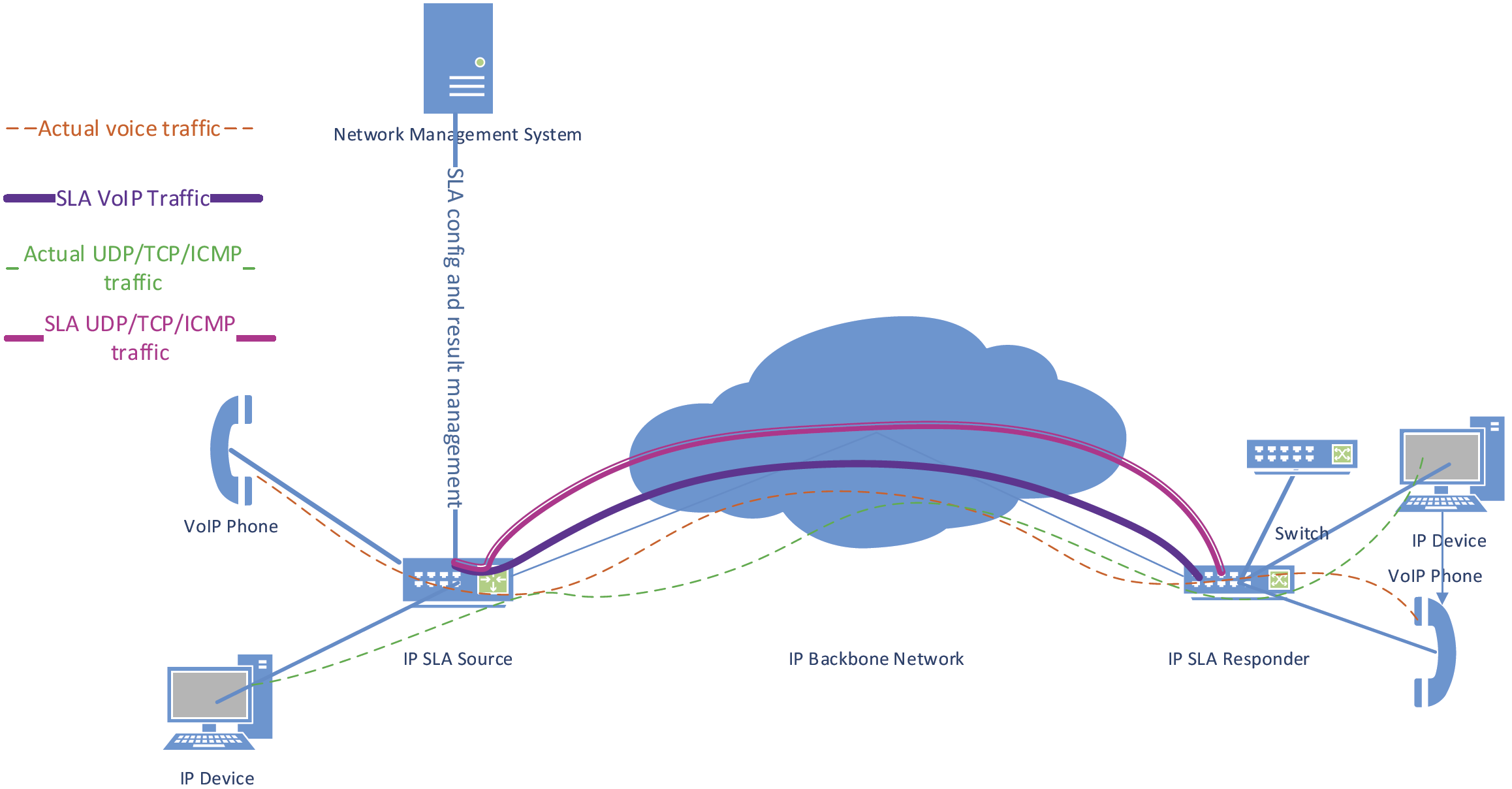Overview
IP Service Level Agreement (IP SLA) is a feature that helps administrators collect information about network performance in real time. With increasing pressure on maintaining agreed-upon Service Level Agreements on Enterprises and ISPs alike, IP SLA serves as a useful tool.

Any IP SLA test involves a source node and a destination node. For all discussions in this document, the source is always an ArubaOS-switch with IP SLA support. As shown in the diagram above, a destination can, in most cases, be any IP-enabled device. For some SLA types that expect a nonstandard response to a test packet, an “SLA responder” must be configured. An “SLA responder” is nothing but an ArubaOS-switch with IP SLA configurations on it that enable it to respond to the test packet.
The IP SLA feature provides:
Application-aware monitoring that simulates actual protocol packets.
Predictable measures that aid in ease of deployment and help with assessment of existing network performance.
Accurate measures of delay and packet loss for time-sensitive applications.
End-to-end measurements to represent actual user experience.
We support the following SLA types:
UDP Echo, including connectivity testing of transport layer (UDP) services, Round-Trip-Time (RTT) measurement, one-way delay, and packet loss details.
ICMP Echo, including connectivity testing, RTT measurement, and packet loss details.
TCP Connect, including connectivity testing of transport layer (TCP) services, and handshake time measurement.
DHCP, which measures the round-trip time taken to discover a DHCP Server and obtain a leased IP address from it.
DNS, which measures the time taken for a DNS resolution. This measures the difference between the time taken to send a request to the DNS server and the time the IP SLA source receives a reply.
User Datagram Protocol (UDP) Jitter, which measures RTT, one way jitter and one way delays.
UDP Jitter for VoIP, which measures RTT, one way jitter, one way delays, ICPIF (Impairment Calculated Planning Impairment Factor) and MOS (Mean Opinion Score).
Limitations for IPSLA support on Aruba switches:
IP SLA is not enabled for IPv6.
DHCP SLA supports DHCPv4 only.
IP SLA tests cannot be initiated over OOBM interfaces.
History results for the configured IP SLAs will not be available after a switchover or a reboot.
Maximum number of IP SLAs that can be configured varies based on the type of SLA test.
When there are multiple IP SLAs configured with destination as hostname, the DNS resolution happens serially. There can be a delay in sending the test probe (which will be sent only after successful DNS resolution).
For TCP Connect SLA type, the four-tuple (source IP/port, destination IP/port) must be unique.
System clocks between the source and the responder must be synchronized with NTP if One Way Delay parameters have to be calculated for UDP Echo tests.
Timeout for probes is 3 seconds for all SLA types and is not configurable.
Transient spikes in RTT occur during the tests (in the source and the responder) if processor usage is high. Consider average result values over a period of time rather than point-in-time results. This is not applicable for UDP Jitter nor Jitter for VoIP.
Entity |
Limit |
|---|---|
Maximum number of SLAs enabled. |
50 |
Maximum history bucket size per SLA.1 |
50 |
Number of responders that can be configured. |
10 |
Not applicable for UDP Jitter and Jitter for VoIP.
The following are operational restrictions with respect to IP SLA jitter implementation:
Feature is supported only on v3-based platforms.
No history results are stored.
IPSLA Jitter and Jitter for VoIP initiator and responder is only supported on 5400R with v3 modules (noncompatibility mode), 3810, and 2930F switches.
The maximum number of Jitter responder sessions (UDP Jitter + Jitter For VoIP) supported is 10. The maximum number of Jitter initiator sessions (UDP Jitter + Jitter For VoIP) supported is 5.
IMC (Intelligent Management Center) supports below IP SLAs:
NOTE:5400R requires V3 modules
UDP Jitter
UDP Jitter Voip
UDP Echo
TCP connect
ICMP echo
DHCP
Measurement of RTT and jitter values is in milliseconds.
IPv6 SLA for UDP jitter and VoIP is not supported.
UDP jitter and UDP jitter for VoIP tests are not supported over Tunnel, Trunk, and OOBM interfaces.
UDP jitter and UDP jitter for VoIP results are not carried forward across failover or a device reboot.
History bucket size cannot be configured for UDP jitter and VoIP tests. Results are aggregated for the last 25 probes.
System clocks between the source and the responder must be synchronized with NTP if One Way Delay parameters have to be calculated for UDP Jitter & UDP Jitter for VoIP tests.
The UDP jitter and UDP jitter for VoIP feature on ArubaOS-Switch has the following limited interoperability with Comware 7 SLA v2 version:
One Way packet drops (SD packet loss and DS packet loss) on the Comware Jitter initiator is not reported when interoperating with Aruba Jitter Responder.
IP SLA responder or initiator implementation is not interoperable with Cisco's IP SLA feature.